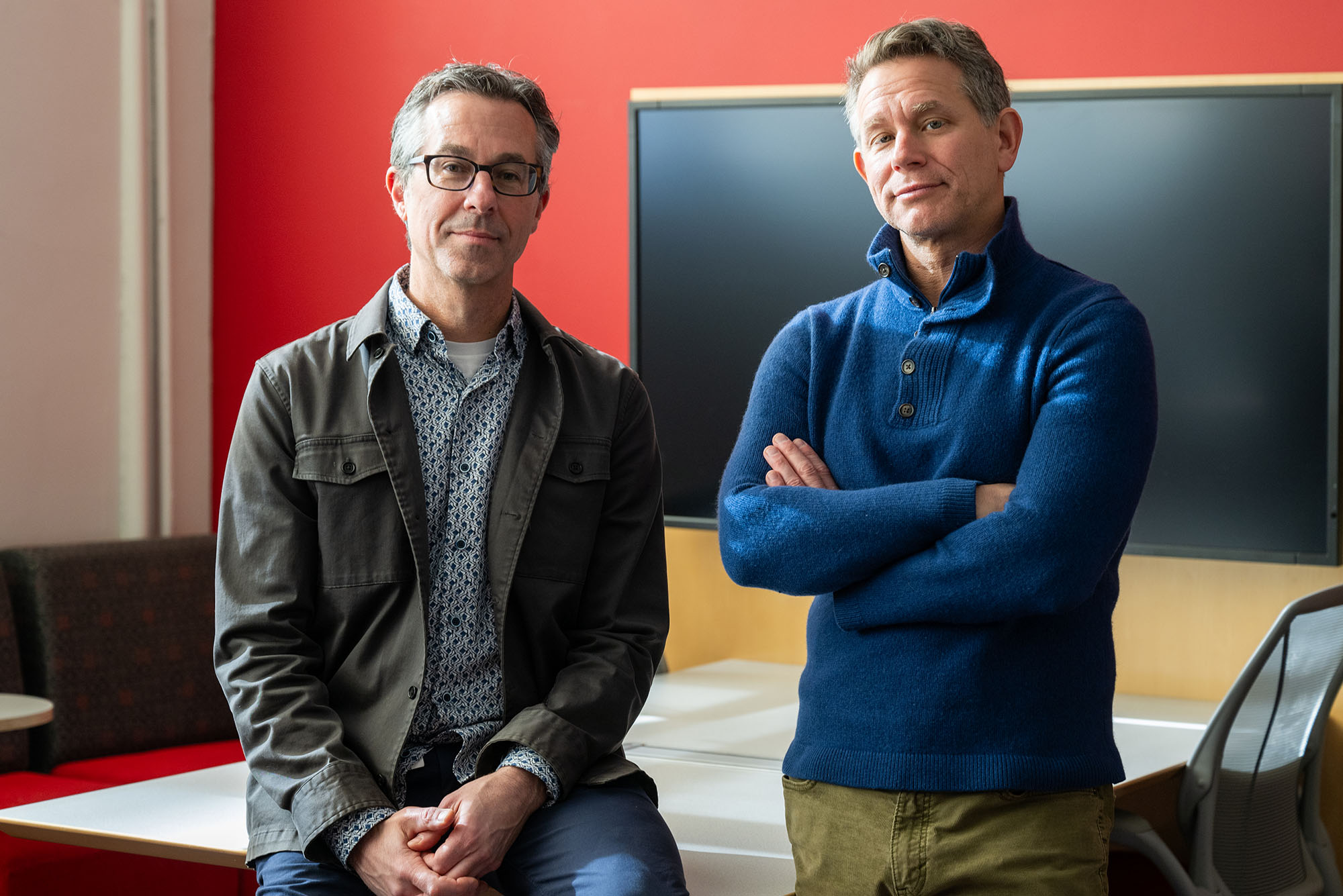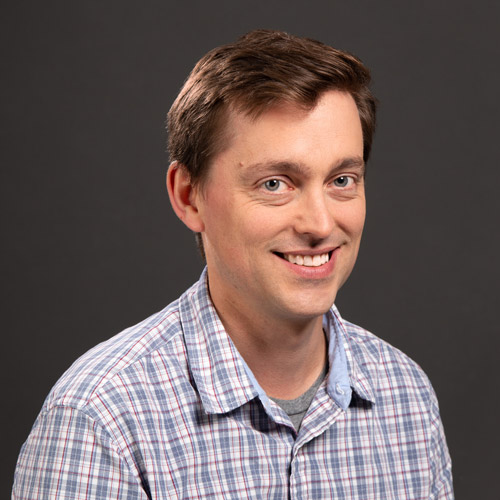COM Set to Open New Center on Media Innovation for Social Impact
Initial projects in environmental justice storytelling slated for summer 2025

COM’s new Center on Media Innovation for Social Impact will be led by Eric Gordon (left), a COM professor of the practice of journalism studies, as director, and David Abel, a COM professor of practice of journalism, as assistant director.
COM Set to Open New Center on Media Innovation for Social Impact
Initial projects in environmental justice storytelling slated for summer 2025
The science is undeniable: Earth’s climate is changing and communities around the world are already suffering the impacts. But, rather than catalyzing action, environmental storytelling often struggles to overcome an erosion of trust in the media and a landscape rife with misinformation and disinformation. That complicated media environment hinders progress on crises ranging from gun violence to pandemic responses.
“Communication helps the world work,” says Mariette DiChristina, dean of the Boston University College of Communication. “But if communication isn’t going well, then the world can’t move forward.” To develop and study effective, trustworthy methods of communication—and to help society move forward, especially in the application of evidence-based science—COM has established the Center on Media Innovation for Social Impact (MISI), which will begin offering programs this summer.
“This center was born out of ambitions to help society unlock its potential through amazing communication,” says DiChristina (COM’86).
Communication grounded in community
MISI will draw on expertise from COM’s advertising, emerging media studies, film and television, journalism, media science, and public relations disciplines, as well from across BU, offering fellowships to faculty and community partners. Leading those efforts will be Eric Gordon, who joined COM in January as a professor of the practice of journalism studies and director of MISI. A communication scholar, Gordon studies the role of technology and media in democratic participation.
“With woefully small levels of trust in democratic institutions, how we communicate through media is an incredibly complicated question right now,” Gordon says. “We need to be experimenting with technologies and approaches to storytelling that are in support of democratic movements, institutions, and people who are working towards a more just and equitable society.”
We need to be experimenting with technologies and approaches to storytelling that are in support of democratic movements, institutions, and people who are working towards a more just and equitable society.
Gordon comes to BU from nearby Emerson College, where he founded and directed the Engagement Lab. There, he helped to develop a collaborative method of storytelling that will be central to some of MISI’s biggest projects: instead of telling stories about the communities most impacted by society’s greatest challenges, he is committed to telling stories with them.
The Engagement Lab pioneered initiatives like Transforming Narratives of Gun Violence and Transforming Narratives for Environmental Justice (TNEJ), bringing community, communication experts, and medical practitioners into the classroom to collaborate on impactful and sustainable projects. MISI will support the growth of both initiatives at BU.
The first BU projects connected to TNEJ begin in June 2025 and will continue through the fall 2025 and spring 2026 semesters. Teams of students, faculty, community fellows, and student project managers will develop and distribute communication products—and analyze how effective they were. “At the end of the day, we need evidence that authentic stories can be used to amplify marginalized voices. We need to understand what kinds of stories and modes of communication can build trust with people who are not inclined to trust anything right now,” Gordon says.
Examples of TNEJ projects completed at Emerson include short films about food justice in Chelsea and parks in Boston, a children’s book, and a zine. With the help of BU experts in different fields, Gordon hopes new projects can tap into the power of virtual reality, data science, artificial intelligence, and other technologies.
“We live in a world with deep inequities and environmental degradation, which too often harms the most vulnerable,” says David Abel, a COM professor of the practice of journalism and assistant director of MISI. “My hope is that this initiative casts light on these societal failures and helps spark action to make change for the better.”
A humanistic approach
The move to BU, Gordon says, is an opportunity to expand on the work he began at Emerson. “We have the ability to not just tell stories, but to actually understand their critical relevance. It broadens our reach considerably.”
On January 28, the Mellon Foundation announced a three year, $487,000 grant to expand TNEJ. The grant, which supports work grounded in the humanities, will fund faculty fellows from COM and the BU Center for the Humanities (BUCH), as well as community fellows who will spend a year working on the teams.
“We hope our faculty can bring new ways of thinking and interpreting to TNEJ, and simultaneously learn and benefit from engagement with local communities on specific challenges of environmental justice and equity,” says Juliet Floyd, Borden Parker Bowne Professor in Philosophy at the College of Arts & Sciences and director of BUCH.
Adapting to societal needs
MISI will open with two areas of focus—environmental justice and community violence prevention—but Gordon says that the center will grow and evolve based on community needs as well as areas of interest and expertise within BU. “Our goal is to partner with communities in Boston to produce communication that has local impact, and to learn from each project to develop a broader understanding of how it all works,” he says.
With the first session of TNEJ set to begin in a few months, Gordon is also focused on supporting the Transforming Narratives of Gun Violence initiative, with his long-standing partnership with the Massachusetts General Hospital’s Gun Violence Prevention Center, the Louis D. Brown Peace Institute, and other community organizations. He plans to solicit research proposals for the first round of MISI grants this summer; teams comprising BU faculty working with community partners will be eligible. The center will also offer fellowships for faculty, students, and community partners. Additional plans include designing new courses and hosting symposiums and conferences, and Gordon hopes to celebrate MISI at a public event in the fall.
The opening of the center culminates a planning process that began a couple of years ago under the direction of Gary Sheffer, the Sandra A. Frazier Professor of Public Relations at COM, who retired in 2024. COM has committed $2.25 million to fund MISI for five years. Additional funding will come from COM’s Feld Family Initiative for Civic Science Communication and from grants.
“Universities are places where we can explore possibilities and where we have safety to fail. Big business isn’t going to do this,” Gordon says. “Many of the communications structures and systems that support our democracy are decomposing. This work is urgently needed. I’m incredibly excited and motivated to do it.”


Comments & Discussion
Boston University moderates comments to facilitate an informed, substantive, civil conversation. Abusive, profane, self-promotional, misleading, incoherent or off-topic comments will be rejected. Moderators are staffed during regular business hours (EST) and can only accept comments written in English. Statistics or facts must include a citation or a link to the citation.